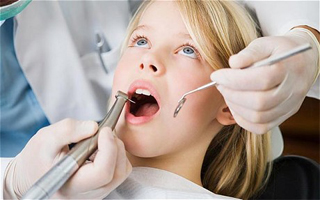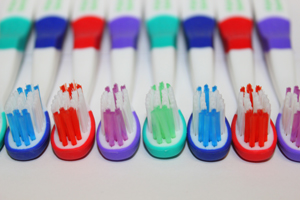 Helping your child build the foundations for strong healthy teeth
From the moment you know you're expecting a child, you can start taking steps that will have a positive impact on the future health of their teeth.
Helping your child build the foundations for strong healthy teeth
From the moment you know you're expecting a child, you can start taking steps that will have a positive impact on the future health of their teeth.Even though a baby's first teeth don't come through (or "erupt") until they are about six months old, these primary teeth will have usually developed before they are born. While good nutrition is an important fundamental to building strong healthy teeth, daily oral care is also required once the teeth begin to appear. And because prevention is better than cure (and also less costly), a visit to your Aurora Dental early in life is a good way to be sure that your child's teeth, mouth and gums are all developing correctly.
Early detal care is also very important because the condition and health of your child's teeth affects their ability to eat solid foods and can impact their speech development and facial appearance.
The first teeth to erupt are normally the central incisors, which are the two middle front teeth in the lower jaw. The full set of 20 primary teeth should should have come through by the age of two.
When wisdom teeth usually erupt somewhere between 18-25 years of age. For some people it can take even longer, while others miss out on wisdom teeth altogether.
The role of primary teeth is to reserve the correct space in the gums for the permanent teeth, and to help your child to chew and speak property. Correct daily dental care is important to ensure that primary teeth are not lost due to dental decay.
The risk of dental decay can also be reduced by considering your baby's nutrition and avoiding certain foods and drinks:
- Don't give your baby or child sugary drinks at after their teeth have been cleared. (This also applies to maintaining the health of adult teeth)
- Avoid giving your baby foods that contain added sugar or concentrated fruit juice. The same applies to sugary or concentrated fruit drinks, which should be limited to about half-a-cup per day, preferably diluted with water.
- Don't add sugar to weaning foods that you prepare at home.
- Don't put sweetened fruit juices, cordial or fizzy drinks in your baby's bottle.
- Never dip a dummy or pacifier into anything sweet such as honey, jam, condensed milk, syrup, glycerine and the like.
- Encourage your child to drink plenty of water.
 Even though a baby usually doesn't need a dental check-up before their first teeth erupt - or they reach their first birthday - we recommend that you bring your baby with you whenever you, your partner or your other children have an appointment with a Aurora Dental. This will help them get used to the environment and surroundings of our dental practice, and make them more relaxed prepared for actual first visit. Take a tour of Aurora Dental office online, please Click Here
Even though a baby usually doesn't need a dental check-up before their first teeth erupt - or they reach their first birthday - we recommend that you bring your baby with you whenever you, your partner or your other children have an appointment with a Aurora Dental. This will help them get used to the environment and surroundings of our dental practice, and make them more relaxed prepared for actual first visit. Take a tour of Aurora Dental office online, please Click Here
Some of the things your dentist will look for during your baby's first check-up include:
- how many baby teeth have erupted and how they are spaced and placed
- any indicators that your child is at risk of dental problems such as crooked teeth
- how effectively the teeth are being cleared
- changes in color, or spotting of teeth, which can signifying early decay
Your dentist will discuss any questions you have about caring for child's teeth and talk to you about the preventative steps you can take to ensure your child enjoys the best dental health. A diagnostic X-ray may be taken, and if requires, your child may be referred to dental specialist; such as a pacdiatric dentist or an orthodontist.
Once your child has had their first appointment with a Aurora Dental, you should bring them back at least twice a year for ongoing check-ups. By commencing this routine early in life and focusing on prevention rather than cure, you'll be giving your child the best chance possible to keep their natural teeth for life.

